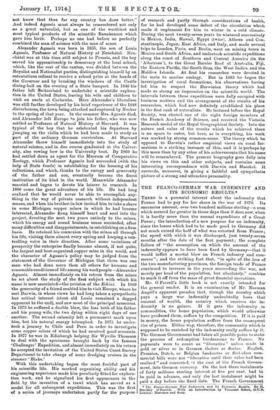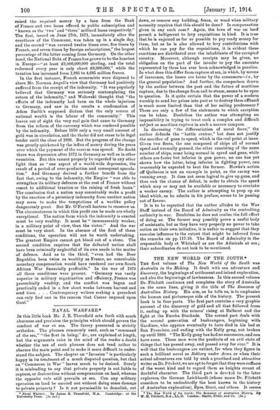THE FRANCO-GERMAN WAR INDEMNITY AND ITS ECONOMIC RESULTS.*
THERE is a perennial interest about the indemnity that France had to pay for her share in the war of 1870. De enormous amount, over two hundred millions sterling—a suni which seemed far greater in those days than it does now, when it is hardly more than the annual expenditure of a Great Power; the introduction of a new purpose for an indemnity, since the losses which had to be made good to Germany did not much exceed the half of what was extorted from France; the speed with which it was discharged, just twenty-seven months after the date of the first payment; the complete failure of "the assumption on which the amount of the indemnity appears to have been fixed by Germany—that it would inflict a mortal blow on French industry and com: meree"; and the striking fact that, "in spite of the loss of the two manufacturing provinces, the foreign trade of France continued to increase in the years succeeding the war, not merely per head of the population, but absolutely," combine to mark it off from the mass of great financial operations.
Mr. O'Farrell's little book is not exactly intended for the general reader. It is an examination of Mr. Norman Angell's apparent paradox that, though the country which pays a large war indemnity undoubtedly loses that amount of wealth, the country which receives the in- demnity is no gainer. If it gets the indemnity in commodities, the home population, which would otherwise have produced them, suffers by the competition. If it is paid in money, the home population suffers from the consequent rise of prices. Either way, therefore, the community which is anpposed to be enriched by the indemnity really suffers by it. The German Government had taken all possible pains to make the process of redemption burdensome to France. No payments were to count as "liberative " unless made in gold or silver or in German thalers or florins. English, Prussian, Dutch, or Belgian banknotes or first-claes com. mercial bills were not " liberative until their value had been realized " and converted, et the cost of the French Govern. ment, into German currency. On the last three instalments of forty millions sterling interest at five per cent. had to be paid in advance, and only the last instalment might be paid a day before the fixed date. The French Government • me Franco-German War Indemnity and Us Economia Results. By H. Handley O'Farrell. Hide an Introduction by Viscount Ether. O.C.B. London: Harrison and Seas.
raised the required money by a loan from the Bank of France and two loans offered to public subscription and " known as the ' t wo ' and ' three' milliard loans respectively." The first, issued on June 27th, 1871, immediately after the overthrow of the Commune, was taken up in a single day, and the second " was covered trielve times over, five times by French, and seven times by foreign subscriptions," the largest percentage of the latter coming from Germany. On the other hand, the National Debt of France bus grown to be the heaviest in Europe—" at least £1,000,000,000 sterling, and the total redeemed every year is only about £6,000,000," while the taxation has increased from 1,985 to 405 million francs.
In the first instance, French economists were disposed to share Mr. Norman Angell's view that Germany bad positively suffered from the receipt of the indemnity. "lt was popularly believed that Germany was seriously contemplating the return of the indemnity," and Wolowaki thought that "the effects of the indemnity had been on the whole injurious to Germany, and saw in the results a confirmation of Adam Smith's supposed dictum that the only source of national wealth is the labour of the community." This leaves out of sight the very real gain that came to Germany from the reform of the currency which was rendered possible by the indemnity. Before 1870 only a very small amount of gold was in circulation, and the t haler did not cease to be legal tender until the close of 1898. But the progress of the change was greatly quickened by the influx of money during the years over which the payment of the ransom was spread. No doubt there was depression after 1872 in Germany as well as in other countries. Bat this cannot properly be regarded in any other light than as "one aspect of a world-wide depression, the result of a period of over-production and consequent specula- tion." And Germany derived a further benefit from the fact that, owing to the indemnity, the Emp:re " was able to strengthen its military defences at the cost of France without resort to additional taxation or the raising of fresh loans." The conclusion that a nation may conceivably make a profit by the exaction of a pecuniary indemnity from another nation may seem to make the temptations of a warlike policy dangerously great. But Mr. O'Farrell hastens to reassure Us. The circumstances in which this profit can be made are wholly exceptional. The nation from 'which the indemnity is exacted must be very wealthy. It must be" immeasurably weaker, in a military point of view, than the victor." And the war must be very short. In the absence of the first of these conditions, the operation will not be worth undertaking. The greatest Empire cannot get blood out of a stone. The second condition requires that the defeated nation shall have been criminally neglectful of its own needs in the matter of defence. And as to the third, "even had the Boer Republica been twice as wealthy as France, no conceivable monetary compensation would hare rendered our own South African War financially profitable." In the war of 1870 all three conditions were present. "Germany was vastly superior in military organization and efficiency, France was proverbially wealthy, and the conflict was begun and practically ended in a few abort weeks between harvest and seed time. . . . Contemporary writers seeking a precedent can only find one in the ransom that Caesar imposed upon Gaul."











































 Previous page
Previous page